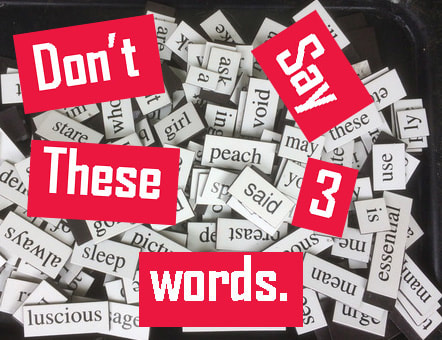“I don't care.”
Whenever I hear an adult in a school say “I don't care”, it’s usually an emotional reaction to an irrational behavior presented by a student. The student has blurted out an indignity (maybe even an "I don't care" of his own) or done something ridiculous either to get revenge, tick off the teacher, exert power, or because they feel threatened in the moment.
Parents provide unconditional love. Teachers should be providing unrelenting education. Kids think that teachers are going to respond like their parents and many times they are correct. Many teachers believe that emotion is the secret sauce for getting their idea across to kids. The more emotionally charged their message, the greater chance it will resonate with the student. It just doesn’t work that way.
Once you say “I don't care” to a child, you are giving them license to believe that you don't care about anything they do. That's the way children think, in blanket concrete terms. It's a difficult bell to un-ring.
One of the things that I remind student teachers of is that they are always going to be the teacher and the students are always going to be the students. The adult is the one with the upper hand, more experience, more power, and more to lose in an escalating verbal battle with a kid so pick your battles carefully.
There are alternatives to saying “I don't care” and still slow rolling your displeasure with the situation of the moment. Some sentence starters are:
“I get the feeling that you're saying . . . . “
“If I'm not mistaken what you're trying to do right now . . . .”
“I had a funny feeling you might say that . . . . .”
“I know how you feel.”
“Let me get you straight . . . “
If you deliver those lines calmly, you have a greater chance of bringing the temperature down in the situation and making yourself look more like a teacher and less like looking as if you're another arguing kid.
Some teachers think that having the power to say “I don't care” is like a superpower. It is a phrase reserved for adults, not kids. It’s three little words that negate the existence of the student’s behavior or argument and, by association, actually momentarily negates the student’s existence in the eyes of the teacher.
“I don't care” becomes a vaporizing gun in the hands of an emotionally unhinged teacher.
Say “I don't care” enough times, and eventually everyone will believe you.
I was transferred into a school where the kids actually told me, “You never say “I don’t care”. Our old teacher said “I don’t care” all the time.”
My response: ‘”Well, I DO care - all the time.”
If you find that you are unable to curb yourself saying “I don't care”, you might want to consider if it's simply projection and what you really don't care about is your own identity and self-worth as a teacher.
When in doubt, care.

 RSS Feed
RSS Feed